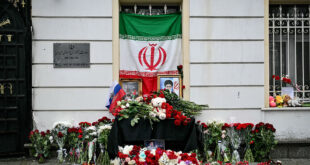 US Secretary of State Condoleezza Rice has warned that Iran poses the biggest threat to US Middle East interests, as she begins a major regional tour. Ms Rice and US Defence Secretary Robert Gates are meeting Egyptian President Hosni Mubarak and Arab ministers at the Red Sea resort of Sharm el-Sheikh.
US Secretary of State Condoleezza Rice has warned that Iran poses the biggest threat to US Middle East interests, as she begins a major regional tour. Ms Rice and US Defence Secretary Robert Gates are meeting Egyptian President Hosni Mubarak and Arab ministers at the Red Sea resort of Sharm el-Sheikh.
The tour is aimed at uniting US allies against Iran, Syria and Hezbollah.
It is also trying to win support for a Mid-East peace conference planned for later this year, correspondents say.
Ms Rice held talks with Arab League Secretary General Amr Moussa, and Rice their said discussions included the situations in Iraq and Lebanon, and the prospects for a two-state solution for Israel and the Palestinians.
Ms Rice said the US was making sure its allies in the region were well protected after Iran accused the US of trying to spread fear and mistrust.
“The United States is determined to assure our allies that we are going to be reliable in helping them to meet their security needs. We have a lot of interests in common in this region: in the fight against terrorism and extremism; in protecting the gains of peace processes of the past and in extending those gains to peace processes of the future,” she said.
Earlier, Iranian foreign ministry spokesman Mohammad Ali Hosseini accused the US of tarnishing good relations between countries in the region.
Iran’s nuclear programme and influence among Shia Muslim militant groups have long been sources of US concern.
During a stopover in Shannon, Ireland, Ms Rice told reporters: “There isn’t a doubt, I think, that Iran constitutes the single most important, single-country challenge to… US interests in the Middle East and to the kind of Middle East that we want to see.”
The trip is the two officials’ first joint tour of the region.
They will visit Egypt and Saudi Arabia together, and other countries separately.
Mr Gates told reporters travelling with him that US officials wanted “to reassure all of the countries that the policies that (US President George W Bush) pursues in Iraq have had and will continue to have regional stability and security as a very high priority”.
Congressional opposition
The meetings come after Washington confirmed plans for a massive arms deal for the region.
The main beneficiaries of the deals are Israel, Egypt and Saudi Arabia.
The $30bn aid to Israel over 10 years represents a 25% increase from present levels.
The Jewish state said the package would allow it to maintain its military “qualitative edge” in the region.
The sale of satellite-guided bombs to Saudi Arabia, the first such sale to any Arab country, is thought to be part of the proposed $20bn arms deal with the kingdom and other Gulf states – the United Arab Emirates (UAE), Kuwait, Qatar, Bahrain and Oman.
During their lobbying tour of the region, Ms Rice and Mr Gates are expected to ask Saudi King Abdullah to do more to support the Iraqi government of Iraqi Prime Minister Nouri Maliki.
The US ambassador to the United Nations, Zalmay Khalilzad, has gone as far as accusing Saudi Arabia of undermining efforts to stabilise Iraq.
The weapons deals need to be approved by Congress, and appear set to encounter opposition.
Two Democratic congressmen, Anthony Weiner and Jerrold Nadler of New York, said at the weekend they would introduce legislation to block military aid to Saudi Arabia.
 Eurasia Press & News
Eurasia Press & News



